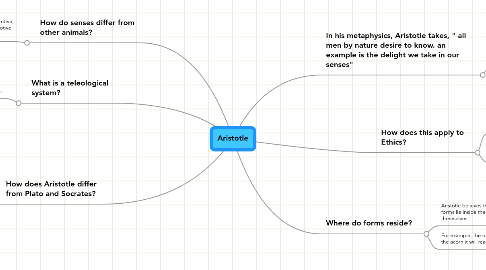Aristotle
作者:juan aguirre


1. How do senses differ from other animals?
1.1. All forms of life have nutritive, reproductive and locomotive power.
1.1.1. Aristotle argues that humans have a special intellectual power called reason, which is the ability to comprehend universals.
2. How does Aristotle differ from Plato and Socrates?
2.1. Aristotle is a scientific and practical thinker.
2.1.1. Doesn't believe in the world of the forms, but thinks that everything that we can understand are the things we can touch.
3. What is a teleological system?
3.1. Aristotle believed that everything in this world has causes the provided four causes.
3.1.1. Material Cause - The Material from which the thing is made
3.1.2. Formal Abuse - the shape or form a thing must take in order to be recognized.
3.1.3. Efficient Cause - What is the ultimate purpose of the thing
3.1.4. Final Cause- what is the ultimate purpose of the thing.
4. In his metaphysics, Aristotle takes, " all men by nature desire to know. an example is the delight we take in our senses"
4.1. Nature does nothing by chance, we have been given senses to use them to understand the world.
4.1.1. To engage the problem of knowledge, we must begin with our senses.
5. Where do forms reside?
5.1. Aristotle believes that the forms lie inside the things themselves
5.1.1. DNA is an example
